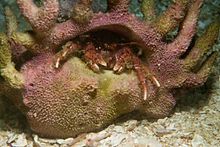Hydrocorella africana, the shell-mimic hydroid, is a small colonial encrusting hydroid in the family Hydractiniidae.[1]
| Hydrocorella africana | |
|---|---|

| |
| shell-mimic hydroid on shell occupied by pink hermit crab | |
| Scientific classification | |
| Domain: | Eukaryota |
| Kingdom: | Animalia |
| Phylum: | Cnidaria |
| Class: | Hydrozoa |
| Order: | Anthoathecata |
| Family: | Hydractiniidae |
| Genus: | Hydrocorella |
| Species: | H. africana
|
| Binomial name | |
| Hydrocorella africana Stechow, 1921
| |
Description
editShell-mimic hydroids grow as calcified colonies of 0.5–2 cm thick on shells of living snails. The colony has a pale chalky skeleton and cream to orange hydranths (feeding individuals).[2]
Distribution
editThis colonial animal is found only off the South African coast from the west coast to Durban subtidally and to 500m under water.[2]
Ecology
editAfter the death of the mollusc the colony may continue growing in an open spiral. The colony often develops into spines and outgrowths, growing to such an extent that the colonised shell becomes unrecognisable.[2]
References
editWikimedia Commons has media related to Hydrocorella africana.
- ^ "WoRMS - World Register of Marine Species - Hydrocorella africana Stechow, 1921". marinespecies.org. Retrieved 2021-01-18.
- ^ a b c Millard, N.A.H. 1975. Monograph on the Hydroida of Southern Africa. Ann. S. Afr. Mus. 68:1-513